'People feel concerned about the future, whether it is the land or the jobs.'
'The BJP came to power in Assam with promises of maati, bheti (home, hearth and identity), land, jobs and culture.'
'Are these going to taken care of? I think those are real concerns.'
'The Assam chief minister (Sarbananda Sonowal) was one of the leaders of the All Assam Students Union which fought for and is one of the signatories to the Assam Accord.'
'Today, his comrade-in-arms (Samujjal Bhattacharya, chief advisor, AASU) is leading the opposition in the streets.'
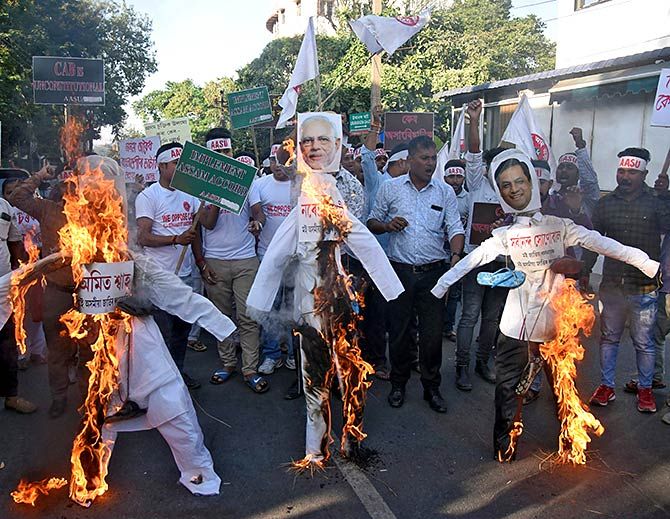
The biggest impact of the Citizenship Amendment Act will be seen in Assam where protests have erupted on the streets, the army is carrying out flag marches, curfew has been imposed and transport services curtailed.
"Is this something that bodes well for the future? I don't think so. It shows how upset people are at being taken for granted. Their voices were not being heard," Sanjoy Hazarika -- journalist, human rights activist, author and film-maker, who is steeped both in Assam's culture and the problems the state is facing -- tells Savera R Someshwar/Rediff.com.
What are the biggest fears about the Citizenship Amendment Act in the north east? Why is the north east against the CAA, especially since most of the north east is exempt from the Act?
In Assam, the CAA and the NRC (National Register of Citizens) are like twins joined at the hip.
They may not be connected in the same way for the rest of India, but they are in Assam because of the large number of people here who are excluded from the NRC list. The issue here is of Hindus of Bengali origin more than anything else, as the others are minuscule in number.
People from the six religious communities which are included for citizenship (Hindu, Sikh, Buddhist, Jain, Parsi, Christian) would benefit from it and that could, in turn, impact the demographic and in pockets in Assam and other parts of the north east.
The fact that this has been met with resistance in the Brahmaputra valley and has been, from what I can understand, largely welcomed in the Barak valley indicates the division.
The Barak valley has Bengali Hindus in substantial numbers and the Brahmaputra valley has a very diverse population speaking many languages and belonging to many ethnicities.
The point is that essentially, in the Brahmaputra valley, the issue is been that of illegal migration and not the religion of the illegal migrant for the most part.
This issue has been communalised in recent years.
But now it's fairly clear that people are saying they won't accept just one community settling here if they have come illegally.
Inner Line Permit areas in Arunachal Pradesh, Nagaland and Mizoram have been excluded from the revised legislation. Manipur has been brought under the Inner Line Permit regime. Sikkim's 371 F Act will not be touched. And yet the north east is roiling.
The Inner Line Permit has always existed in Nagaland, in Arunachal...
But how does it solve the problem?
People are concerned about people who are already there and who have been legitimised.
Whether you agree with the process or not is a different thing. The resistance is to the large numbers of people who have not come legitimately and that you are responding favourably to them on grounds of religion.
That is the crux of the matter.
A majority of the large number of people who were excluded from the NRC list are Hindus of Bengali origin. A much smaller number are Muslims and a lakh or more belong to tribal communities.
Yet, many north east MPs supported the Citizenship Amendment Bill in Parliament.
Well, how many MPs were from the Opposition?
The biggest turmoil is taking place in two states run by the BJP (Bharatiya Janata Party).
It's not what happened in Delhi that counts; it's what is happening in the field that matters.
And really, for me, it doesn't matter whether it's a Congress government or a BJP government or whatever; they need to understand there are concerns which they need to meet.
If it's a perception problem, then that needs to be addressed through dialogue and through conversations.
The State should not give up on dialogue just because there is an agenda to be promoted or pushed.
Please don't give up just because somebody wants to push an agenda or bill.
You need to keep negotiating and discussing and keeping the doors of dialogue open.
In Assam, train services have been curtailed; a number of flights have been cancelled from both Guwahati and Dibrugarh.
The streets are empty; the stores are shut.
The army is conducting flag marches and curfew is in place.
Is this something that bodes well for the future? I don't think so.
It shows how upset people are at being taken for granted. Their voices were not being heard.
The reaction to CAA is the resentment of people that they really have not been consulted on this, that their concerns have not been taken into consideration.
MPs and MLAs are the representatives of the people, but so are influential groups like the Sahitya Sabha, film-makers, artists, editors and scholars.
The government can't just talk to one set of people who largely agree with them and say consultations have taken place.
They should have talked to them to find out what the issues are... Something like that was really necessary, whether through a select parliamentary committee, which was done last time (when the then Citizenship Bill, which was passed in the Lok Sabha on January 8, 2019, lapsed with the dissolution of the 16th Lok Sabha) but didn't happen this time.
The extent of the consultation was not as deep and as extensive as it could and should have been.
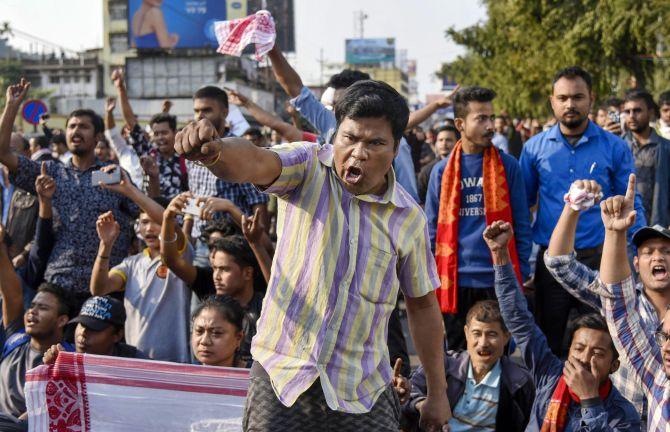
Where does it leave the Assam Accord?
It raises a question about its entire future.
The CAA essentially says anybody who came from the six mentioned groups before 2014 will become Indian citizens.
The Assam Accord says anybody who has come after 1971 will be detected and the process of deportation, according to law, will take place.
So what happens to that? It is a huge question mark.
The Assam Accord also stated that Constitutional, legislative and administrative safeguards, as may be appropriate, shall be provided to protect, preserve and promote the cultural, social, linguistic identity and heritage of the Assamese people without defining what Assamese means.
There are many people who don't see themselves as Assamese, but are residents of Assam.
This has not come into place 34 years after the Assam Accord was signed (in 1985).
There have been different governments, headed by different political parties, both in Assam and in Delhi, in 34 years.
So I think there's a great sense of being let down because the BJP raised high hopes here. Elections were fought in many Lok Sabha seats on the plank of illegal migration and the fact that the illegal migrants would be sent packing.
People are very sensitive about this issue because nothing like that has happened. It has been a live issue in Assam for not just 10 or 20 years, but since the 1920s and 1930s.
The Assam Accord did not discriminate on religious grounds as far as detection of immigrants or foreigners was concerned.
Do you know the official title of what's called the Assam Accord? It's The Problem Of Foreigners In Assam: Memorandum of Settlement.
Of course, the NRC didn't make many people happy because many nationalist leaders thought large numbers of Muslims would be found. That didn't happen (the majority of the 19 lakh people excluded from the final NRC list were Hindus).
The BJP has rejected this list and said it is going to contest it in the Supreme Court. Others have accepted it.
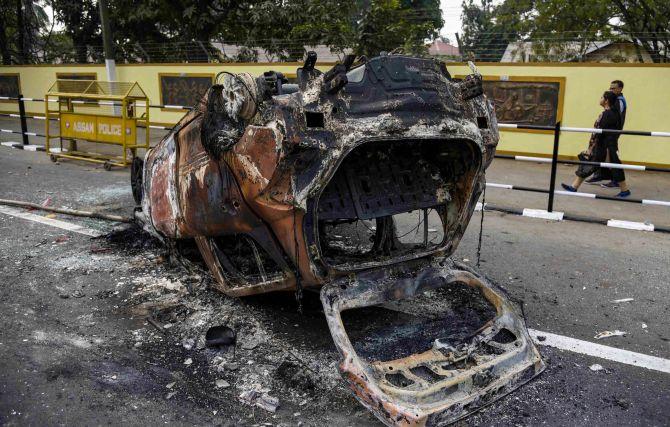
Home Minister Amit Anilchandra Shah has said Muslim refugees are coming to India for economic gain and not because of religious persecution. He also told Parliament that the bill does not target India's minorities. What message does legislation like this send to India's minority communities?
The issue is in Assam. The core problem, the core challenge is in Assam.
People are not rioting elsewhere, are they? So why are you talking about the rest of the country?
Partition took place in two parts of India. One was the north west and the other was the east.
There are many parts of India -- like central India or southern India -- that were either not touched by it or felt some echoes.
Certainly, in the south, the CAA is not a big issue as it is for some groups here.
For the rest of the country, the CAA takes care of the lakhs of people who have been waiting to bring a long term visa.
There is a Parliamentary joint consultative committee meet report on this and I would urge you to look at it.
As far as Assam, it is almost like a case apart. It is the only state where, in 1951, you had the NRC. We have another one now which again is being challenged on various counts.
I think we need to be concerned about their giving shelter to what they call persecuted minorities.
Is there a definition of persecution is in the bill? It is not there. There are no indicators. So how do you make out if somebody has come for economic reasons or religious reasons or environmental reasons or education reasons?
Is everybody a refugee?
And we are not even a signatory to the Geneva Convention on refugees.
The cancellation of the Bangladeshi foreign minister's visit shows how our neighbours are feeling.
It was cancelled just a few hours before he was to arrive in India and he has rejected the allegation that minorities are facing persecution in his country.
If you look at the MEA's response is that religious persecution is not happening under the present Bangladeshi government and that the migrants have faced persecution and abuse on religious grounds during the military rule and also under previous governments.
The MEA also acknowledged that the present Bangladeshi government has taken steps to substantially address the concerns of the minorities as per their constitution and their laws.
It is really very defensive response.
When you take a decision, you have to see it out in other countries, especially your neighbours.
Pakistan will say what it wants; you don't have to hold a candle to what they say.
But as far as Bangladesh is concerned, we need to be very, very careful on how this will play out because there are a large number of people who are part of the Hindu minority there, how will this affect them?
Has enough thought been given to that because the protection extended to the six groups is limited to India? You can't extend it that to another country because they have their own constitutions and their own provisions of law. And they have their own challenges as well.
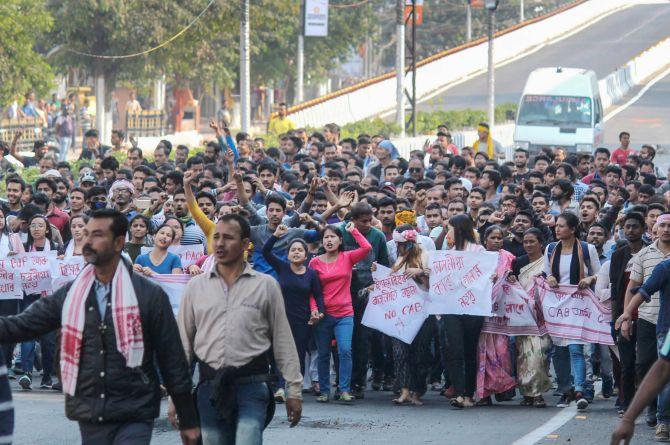
When a state's demography changes because of something like this, how does it economically and culturally impact the people?
You are seeing the reactions in Assam? That's the answer, no?
People feel concerned about the future, whether it is the land or the jobs.
The BJP came to power in Assam with promises of maati, bheti (home, hearth and identity), land, jobs and culture.
Are these going to taken care of? I think those are real concerns.
And the Assam chief minister (Sarbananda Sonowal) was one of the leaders of the All Assam Students Union which fought for and is one of the signatories to the Assam Accord.
Today, his comrade-in-arms (Samujjal Bhattacharya, chief advisor, AASU) is leading the opposition in the streets. On December 12, after two days (since violence erupted in Assam), he (Sonowal) has come up with a statement.
Not many people remember the Nellie massacre of 1983. Do you think the situation in Assam today is leading towards something like that?
No, no, I don't think anybody wants to go back to the troubled days of the past.
People are reacting to the way the decisions have been made and the way they are being handled.
I certainly hope that things remain peaceful because movements have to be peaceful to have resonance.
Everybody must be open for dialogue on both sides and there has to be a sense of inclusion, no?
Is this an attempt by Prime Minister Narendra Damodardas Modi to establish his mark on India's culture, to make it a Hindu Rashtra versus what it has always been --- a Hindu dominated nation where all religions and cultures can flourish?
Well, it's a momentous effort to change the ethos and culture and politics of India.
And, while it has met with opposition and resistance, it has also met with a lot of support from those who believe in that perspective.
The law has been passed, the President has to sign it (the interview was conducted before President Ram Nath Kovind signed it). It will be challenged, I'm sure, in the Supreme Court.
It is early days, yet; we have to wait and see how it plays out.
The door on dialogue should never be closed by the government.
It must always be kept open.



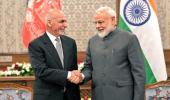







 © 2025
© 2025